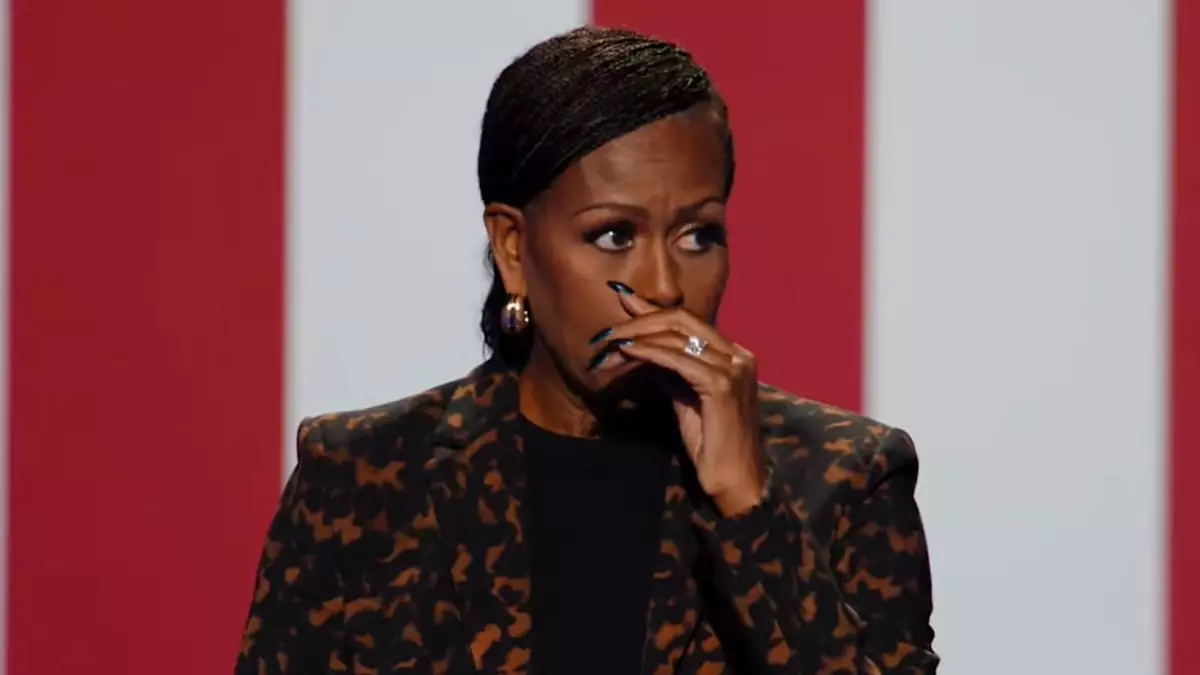On October 26, 2024, Michelle Obama stood before a roaring crowd in Michigan, lending her voice to support Kamala Harris’s presidential campaign. As she donned a striking tortoiseshell pantsuit, the former First Lady captured the audience’s attention—not just with her appearance, but with her heartfelt discourse on women’s health, particularly focusing on the often-ignored struggle of menopause. Given the societal tendency to shy away from discussions about women’s health issues, Obama used this platform as a vital opportunity to shed light on topics that transcend political discourse, delving deeply into the intersection of women’s rights, health care, and democracy.
In her emotionally charged speech, Obama highlighted the shame that women have been traditionally conditioned to feel regarding their bodies. By stating that “we’ve been taught shame and how to hide how our bodies work,” she pointed to a crucial cultural narrative that limits discussions about reproductive health. Indeed, conditions such as severe menstrual cramps, menopause symptoms, and the mental health issues associated with them are rarely subject to the open dialogue they deserve. With a call to action, she pressed the audience to recognize the importance of women’s health not as a shameful secret, but as a significant aspect of public health that requires urgent attention and understanding.
This call to dismantle the stigmas surrounding discussions of women’s experiences became particularly poignant when she noted how silence often leaves many women battling through their pain alone. Abe made a compelling case that if such discussions were normalized, women could find solidarity in shared experiences, leading to better health outcomes and medical support.
Michelle’s reflection on the physical vulnerabilities women endure resonated with the audience. By addressing real concerns such as unexpected medical findings—ranging from abnormal pap smears to the terrifying possibilities of cancer—her words emphasized the urgent need for preventive care. She articulated that, “in those terrifying moments… it feels like the floor falls out from under us,” encapsulating the anxiety many women face regarding their health.
Moreover, her assertion that societal neglect in understanding women’s health translates to significant lapses in medical care struck a chord. The data suggesting that women of color receive even less attention and care highlighted systemic inequities in the healthcare system, stressing that this should not be a partisan issue but a societal concern where everyone shares the responsibility.
The Call for Collective Responsibility
In a direct address to men in the audience, Obama didn’t shy away from the gravity of the situation, urging listeners to understand that women’s healthcare issues directly impact families, partners, and society as a whole. Her plea was not just an emotional appeal but a clarion call for collective responsibility regarding women’s health. By painting vivid scenarios in which men might find themselves grappling with the consequences of inadequate health care—whether that be losing a partner or facing the struggles of raising children alone—she effectively broadened the spectrum of this dialogue beyond women’s experiences into the communal realm.
This approach led to a more inclusive conversation about health that emphasized understanding and empathy rather than division, inviting men to become allies in advocating for women’s rights and healthcare improvements.
As if to conclude on an uplifting note amidst the heavy subject matter, Obama reminded her audience of the importance of empowering future generations. Drawing a parallel to the responsibilities that individuals, especially elected officials, have in shaping an environment where women can thrive, she looked to collective action as a solution. The reminders of past struggles and the vision for a future where young girls grow up without limitations added a hopeful outlook to her address.
As her speech unfolded, the synergy between her narrative and the political rally became clear: it was about more than supporting a candidate; it was about fostering a culture that honors the complexities of women’s experiences and elevates their needs in political discussions.
Michelle Obama’s speech was more than just a political endorsement; it was a clarion call for acknowledgment, compassion, and action regarding women’s health issues. Her ability to intertwine personal experience with broader societal implications encouraged listeners to consider their collective role in addressing these often-overlooked aspects of healthcare. The resonant message? That everyone—regardless of gender—has a stake in the health of women and, by extension, the health of the nation. The rallying cry for support towards women’s health during this critical election period serves as a reminder that democracy is inextricably linked to the health and well-being of its citizens.
